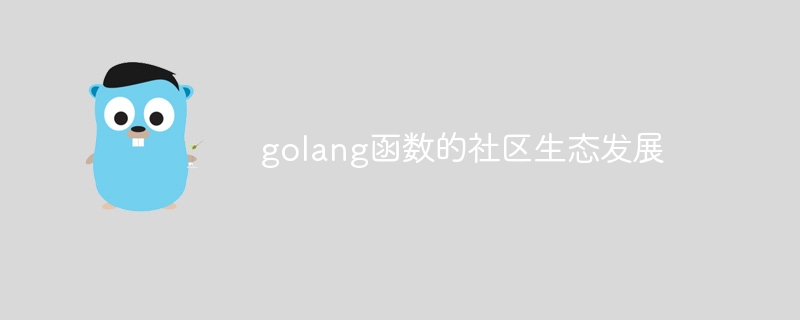Home >Backend Development >Golang >Community ecological development of golang functions
Community ecological development of golang functions
- WBOYWBOYWBOYWBOYWBOYWBOYWBOYWBOYWBOYWBOYWBOYWBOYWBOriginal
- 2024-04-28 14:36:011079browse
The Go language's function ecosystem is rich with community packages covering a wide range of uses, from utilities to domain-specific tools. Utility libraries include: Gorilla Mux router, MySQL driver, Viper configuration package. Domain-specific tools include: AWS SDK, Redigo Redis package, and Kin-tonic RESTful API framework. By integrating these packages, developers can easily extend application functionality, such as creating HTTP servers using Gorilla Mux and MySQL drivers.

Rich community ecosystem of Go functions
The Go language function ecosystem contains many packages contributed by the community, allowing developers to Able to easily extend the functionality of their applications. These packages cover a wide range of uses, from common utilities to domain-specific tools.
Utility library:
- github.com/gorilla/mux: Modular router for building high-performance RESTful routers
- github.com/go-sql-driver/mysql: Official driver for interacting with MySQL database
- github.com/spf13/viper : Packages for reading and parsing configuration in various formats
Domain-specific tools:
- github. com/aws/aws-sdk-go: Comprehensive suite for interacting with Amazon Web Services (AWS)
- github.com/gomodule/redigo: For interacting with Redis High-performance package for server interaction
- github.com/getkin/kin-tonic:Modern framework for building RESTful API
Practical case :
Create a simple HTTP server using Gorilla Mux router and MySQL driver:
package main
import (
"database/sql"
"fmt"
"github.com/gorilla/mux"
_ "github.com/go-sql-driver/mysql"
"net/http"
)
func main() {
// 创建 MySQL 数据库连接
db, err := sql.Open("mysql", "user:password@tcp(localhost:3306)/database")
if err != nil {
panic(err)
}
defer db.Close()
// 创建一个新的路由器
router := mux.NewRouter()
// 注册处理程序函数
router.HandleFunc("/users", getUsers(db)).Methods(http.MethodGet)
router.HandleFunc("/users/{id}", getUser(db)).Methods(http.MethodGet)
// 启动服务器
fmt.Println("Server listening on port 8080")
http.ListenAndServe(":8080", router)
}
func getUsers(db *sql.DB) http.HandlerFunc {
return func(w http.ResponseWriter, r *http.Request) {
w.Header().Set("Content-Type", "application/json")
rows, err := db.Query("SELECT id, name, email FROM users")
if err != nil {
http.Error(w, err.Error(), http.StatusInternalServerError)
return
}
defer rows.Close()
var users []map[string]interface{}
for rows.Next() {
var m = map[string]interface{}{}
var id int64
var name, email string
if err := rows.Scan(&id, &name, &email); err != nil {
http.Error(w, err.Error(), http.StatusInternalServerError)
return
}
m["id"] = id
m["name"] = name
m["email"] = email
users = append(users, m)
}
// 编码响应
if err := json.NewEncoder(w).Encode(users); err != nil {
http.Error(w, err.Error(), http.StatusInternalServerError)
return
}
}
}
func getUser(db *sql.DB) http.HandlerFunc {
return func(w http.ResponseWriter, r *http.Request) {
w.Header().Set("Content-Type", "application/json")
vars := mux.Vars(r)
id := vars["id"]
row := db.QueryRow("SELECT id, name, email FROM users WHERE id = ?", id)
var u = map[string]interface{}{}
var name, email string
if err := row.Scan(&id, &name, &email); err != nil {
http.Error(w, err.Error(), http.StatusNotFound)
return
}
u["id"] = id
u["name"] = name
u["email"] = email
// 编码响应
if err := json.NewEncoder(w).Encode(u); err != nil {
http.Error(w, err.Error(), http.StatusInternalServerError)
return
}
}
}The above is the detailed content of Community ecological development of golang functions. For more information, please follow other related articles on the PHP Chinese website!

